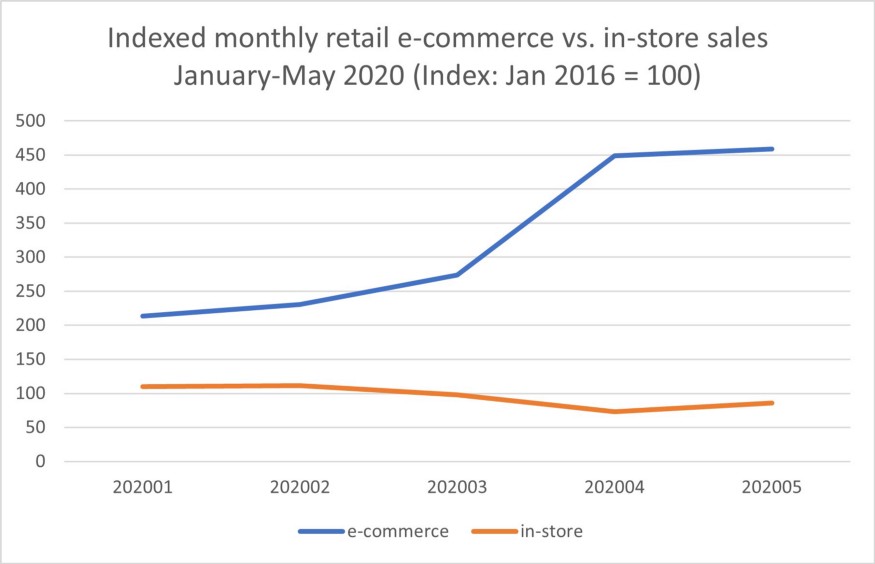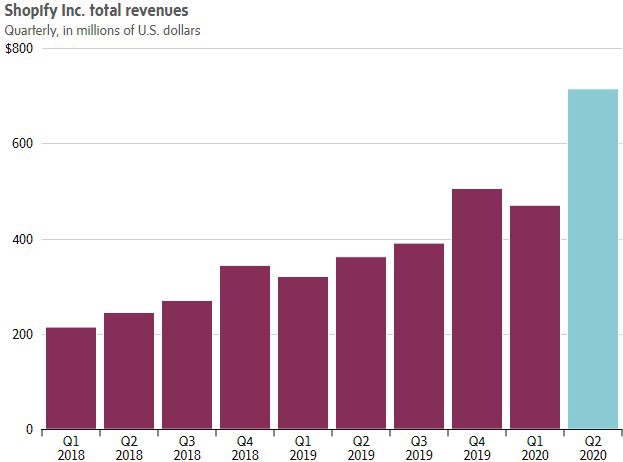Only nine months ago, proponents of Intelligent Retail and e-commerce focused on the importance of innovation to make the case for adopting technology advances and omni-channel strategies. With many brick-and-mortar stores forced to close, limited consumer physical movement (by choice and regulation), interrupted supply chains, and the growing influence of e-commerce giants like Amazon, COVID-19 has exposed the weaknesses in traditional retail strategies during an era of mass digitization.
Small Canadian retailers without an online presence have become especially vulnerable. On October 1, 2020, the Canada Emergency Commercial Rent Assistance (CECRA) program expired, leaving October rents due — in full — for the struggling small retailers. As the COVID-19 pandemic begins its second wave, and provinces tighten restrictions again, retailers of all sizes need to adapt.
Intelligent Retail (including e-commerce) is characterized by the movement from product-centric strategies to consumer-centric strategies by leveraging digital technologies to integrate supply chains and enhance in-store consumer experience and omni-channel consumer relationships.

Photo by Bench Accounting on Unsplash
According to a Statistics Canada September 2020 report, July 2020 retail e-commerce sales were $2.8 billion, a 62.2% year-over-year increase.[i] Earlier in the pandemic, Statistics Canada highlighted record e-commerce growth ($3.9 billion in May) while total retail sales had record declines ($33.9 billion in April). In April 2020, the proportion of retail e-commerce sales of total retail sales hit an all-time high of 11.4% (Figure 1).[ii]

Figure 1. Source: Statistics Canada, Monthly Retail Trade Survey
Small Canadian retailers now have domestic partners who can help them ease into Intelligent Retail. Shopify has been a stock market darling as the pandemic pushes retailers that can’t afford their own e-commerce/omni-channel team and infrastructure to embrace intelligent retail solutions (Figure 2).[iii] Shopify has also increased its presence in smart supply chain services through its Shopify Fulfillment Network and the acquisition of warehouse fulfilment robots and the software company, 6 River Systems.

Figure 2. Source: Globe and Mail, Shopify Inc. Financials
However, Shopify is not the only Canadian digital business making headway in this space. Smaller retail technology companies are also helping traditional retailers benefit from the opportunities in Intelligent Retail. Montreal has a strong and growing portfolio of Intelligent Retail companies. Raange offers retailers a smoother transition to digital sales channels, especially mobile oriented solutions. Thirdshelf provides small to medium-sized retailers the ability to extend customer loyalty programs to their customers.
A new trend called “Appointment Shopping” is rapidly becoming an option for retailers who want to give customers the VIP experience while easily conforming to COVID-19 restrictions.[iv] Intelligent Retail allows digital channels to attract appointment shopping consumers, enables digital reservations, and offers integration into inventory/warehousing systems. Even before the pandemic, Canadian retailer Sport Chek offered appointment shopping for snow sports advice.[v]
In an interview with Retail Insider, retail supply chain strategist Gary Newbury lays out the opportunities and the pitfalls of post-COVID-19 retail:
“Many people experienced online services for the first time over the last four months, some had a great experience, some not so great. If somewhere in the order of 50 percent of people would prefer to avoid retail stores (lots of friction currently), this is a big prize for retailers to go after, however, they need to approach this opportunity with care, ensure they elicit the help of digital fulfillment experts, be open to look at digital retailing in a different way (skip the extended aisles and pricing mechanisms etc), and ensure they fully comprehend the financials of online if they are going to develop a profitable online business,”[vi]
Intelligent Retail can help Canadian retailers adapt quickly to abruptly changing consumer behaviour brought about by COVID-19. The question is, do retailers have the ability and will to adapt promptly.
[i] Statistics Canada, “Retail trade, July 2020”, https://www150.statcan.gc.ca/n1/daily-quotidien/200918/dq200918a-eng.htm?indid=3660-1&indgeo=0, September 18, 2020
[ii] Statistics Canada, “Retail e-commerce and COVID-19: How online shopping opened doors while many were closing”, https://www150.statcan.gc.ca/n1/pub/45-28-0001/2020001/article/00064-eng.htm, July 24, 2020
[iii] Josh O’Kane, “Shopify soars as pandemic pushes more businesses to e-commerce”, https://www.theglobeandmail.co…, Globe and Mail, July 29, 2020
[iv] Mark Burnstein, “4 Reasons Why Retailers Should Re-Open With Shopping by Appointment”, https://www.sdcexec.com/wareho… , Supply and Demand Chain Executive, July 7, 2020
[v] Sport Chek, “Shop Buy Appointment”, https://www.sportchek.ca/shop-…
[vi] Mario Toneguzzi, “Retail E-Commerce Explodes in Canada Amid COVID-19 Pandemic”, https://www.retail-insider.com… c, Retail Insider, July 29, 2020
